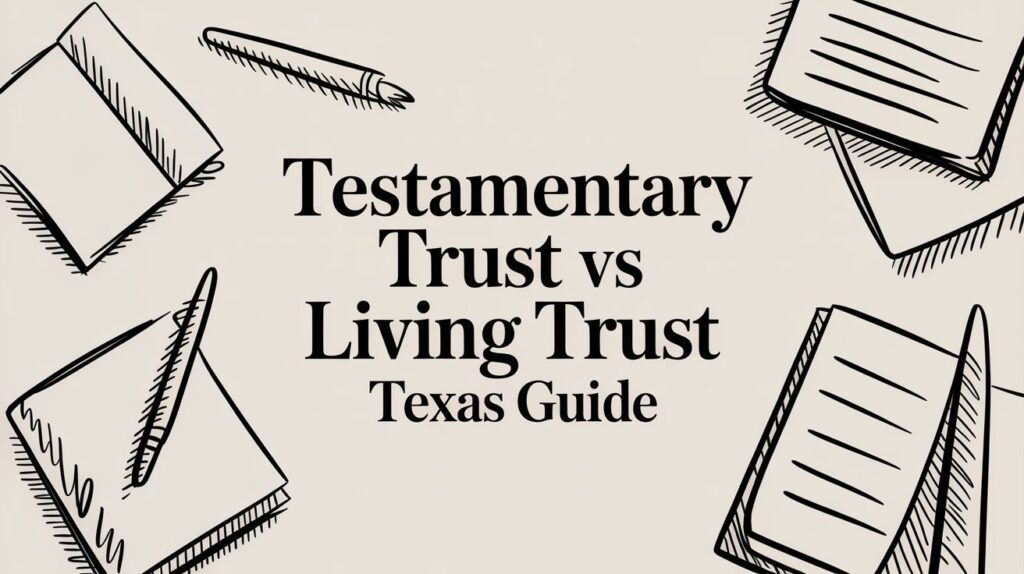Few documents hold as much significance in Texas estate planning as a will. A will is more than just a piece of paper; it is a powerful tool that ensures your wishes are honored, and your loved ones are provided for after you’re gone. This guide delves into the importance of wills in Texas estate planning, exploring their functions, benefits, and potential consequences of not having one.
Understanding Wills: A Fundamental Estate Planning Tool
A will, or last will and testament, is a legal document that outlines how your assets should be distributed upon your death. It allows you to specify who receives your property, name guardians for minor children, and appoint an executor to manage your estate. In Texas, the laws governing wills are designed to ensure that your wishes are respected and that the probate process is as smooth as possible.
Key Elements of a Will
Before we dive into why having a will is crucial, let’s break down its key elements:
1. Executor Appointment: The executor is responsible for administering your estate, paying debts, and distributing assets as per your instructions. Choosing a trustworthy and competent executor is essential.
2. Beneficiary Designations: A will allows you to specify who will inherit your assets. These can include family members, friends, and even charitable organizations.

3. Guardianship Designations: If you have minor children, a will lets you appoint guardians to care for them in the event of your untimely death.
4. Specific Bequests: You can make specific bequests, such as leaving a cherished heirloom to a particular person or donating money to a favorite charity.
5. Residuary Clause: This clause ensures that any assets not specifically mentioned in the will are distributed according to your general wishes.
Why a Will is Essential in Texas Estate Planning
Having a will is a cornerstone of effective estate planning for several reasons:
1. Control Over Asset Distribution: Without a will, the distribution of your assets will be subject to Texas intestacy laws. These laws follow a predetermined formula that may not align with your personal wishes. A will lets you dictate exactly who gets what, ensuring your intentions are fulfilled.
2. Protection for Minor Children: A will is the only way to name a guardian if you have minor children. With this designation, the court will appoint a guardian, which may align with your preferences. By naming a trusted individual, you can ensure your children are cared for by someone who shares your values and parenting philosophy.
3. Minimizing Family Conflicts: The death of a loved one is a challenging time, and disputes over the estate can exacerbate the emotional turmoil. A drafted will help prevent misunderstandings and conflicts among family members by providing clear instructions for the distribution of assets.
4. Expedited Probate Process: While probate is still required with a will, having one can streamline the process. The court will already have your instructions, making it easier to settle your estate efficiently. The process can be more complicated, time-consuming, and costly without a will.
5. Tax Benefits: A well-crafted will can include provisions to minimize estate taxes and other expenses, preserving more of your estate for your beneficiaries. Proper planning can also reduce the overall tax burden on your heirs.
6. Charitable Contributions: A will is the perfect vehicle to leave part of your estate to charitable organizations. This ensures that your philanthropic goals are achieved and your legacy supports causes you care about.
Consequences of Not Having a Will

The absence of a will, also known as dying intestate, can lead to several negative consequences:
1. Intestate Succession: Without a will, Texas intestate succession laws dictate how your assets are distributed. These laws prioritize spouses, children, and other close relatives, but they might not reflect your personal wishes. For instance, unmarried partners, stepchildren, and friends typically receive nothing under these laws.
2. Court-Appointed Guardians: The court will appoint a guardian if you have minor children and no will. This decision might not align with your preferences and could lead to disputes among family members.
3. Increased Legal Costs and Delays: Settling an intestate estate can be more complex and time-consuming, resulting in higher legal fees and longer delays in distributing assets to heirs. This can place a financial and emotional strain on your loved ones.
4. Family Disputes: The lack of a clear estate plan can lead to disagreements among surviving family members, potentially causing long-lasting rifts. A will helps mitigate this risk by providing clear instructions for asset distribution.
Creating a Valid Will in Texas
To ensure your will is valid and legally binding, it must meet specific requirements under Texas law:
1. Legal Age and Capacity: The testator (the person creating the will) must be at least 18 years old and of sound mind.
2. Written Document: The will must be in writing. Oral wills, or nuncupative wills, are not recognized in Texas.
3. Signature and Witnesses: The testator must sign the will, which must be witnessed by at least two credible witnesses at least 14 years old. These witnesses should not be beneficiaries of the will to avoid conflicts of interest.
4. Self-Proving Affidavit: While not required, a self-proving affidavit can simplify the probate process. This affidavit, signed by the testator and witnesses in the presence of a notary, validates the will’s authenticity without the need for witness testimony during probate.
Steps to Creating a Comprehensive Will
Creating a will involves several key steps to ensure that it accurately reflects your wishes and complies with Texas law:
1. Take Inventory of Your Assets: Begin by compiling a detailed list of all your assets, including real estate, bank accounts, investments, personal belongings, and any other property you own. This comprehensive inventory will help determine how you want to distribute your estate.
2. Determine Your Beneficiaries: Decide who will receive your assets. These can include family members, friends, and charitable organizations. Be specific in your designations to avoid confusion and potential disputes.
3. Appoint an Executor: Choose a trusted individual to serve as the executor of your will. This person will manage your estate, pay debts, and distribute assets according to your wishes.
4. Consider Guardianship: If you have minor children, consider who you would like to appoint as their guardian. Discuss your choice with the potential guardian to ensure they are willing and able to take on this responsibility.
5. Draft Your Will: Write your will, either by using a template or by working with an estate planning attorney. Be clear and specific in your instructions to avoid ambiguity.
6. Sign and Witness: Sign your will in the presence of at least two credible witnesses who are not beneficiaries. Have them sign the will as well to validate it.
7. Store Your Will Safely: Keep your will in a safe and accessible location, such as a fireproof safe. Inform your executor and a trusted family member or friend about the location of your will.
Updating Your Will
Life is dynamic, and your estate plan should reflect any significant changes in your circumstances. Regularly reviewing and updating your will ensures it aligns with your current wishes. Consider revising your will after major life events, such as:
- Marriage or divorce
- Birth or adoption of children
- Significant changes in your financial situation
- The death of a beneficiary or executor
The Role of Estate Planning Attorneys
While drafting a will without professional assistance is possible, consulting an estate planning attorney is highly advisable. An attorney can provide valuable guidance, ensure your will complies with Texas laws, and help you navigate complex issues, such as:
- Tax planning and asset protection
- Addressing blended family dynamics
- Establishing trusts for minor children or special needs beneficiaries
- Charitable giving strategies
Trusts as a Complement to Wills
In addition to a will, incorporating trusts into your estate plan can provide further benefits and protections. Trusts can help manage and distribute your assets efficiently, protect your privacy, and avoid probate. Common types of trusts include:
1. Revocable Living Trusts: These trusts allow you to retain control over your assets during your lifetime and specify how they should be managed and distributed after your death. Assets in a revocable living trust typically avoid probate.
2. Irrevocable Trusts: Once established, irrevocable trusts cannot be easily modified or revoked. They offer significant asset protection and tax benefits but require relinquishing control over the assets placed in the trust.
3. Special Needs Trusts: These trusts are designed to provide for disabled beneficiaries without affecting their eligibility for government benefits. They ensure the beneficiary’s needs are met without compromising their financial assistance.
4. Charitable Trusts: These allow you to leave a portion of your estate to charitable organizations while potentially receiving tax benefits. They can be structured to provide income to beneficiaries during their lifetime, with the remaining assets going to charity.
Examples: The Impact of Having a Will
To further illustrate the importance of having a will, let’s consider a few real-life scenarios:
1. John and Mary: John and Mary, a married couple with two young children, decided to create a will to secure their children’s future. They named trusted friends as guardians and set up a trust to manage their children’s inheritance until they reached adulthood. When John and Mary tragically passed away in an accident, their will provided clear instructions, and their children were cared for by the appointed guardians without any court disputes.
2. Robert: Robert, a successful entrepreneur, wanted to ensure his business would thrive after his death. He created a will that included provisions for transferring his business to a capable successor and outlined how the profits should be distributed among his family and charitable causes. His foresight ensured a smooth transition and preserved his legacy.

3. Sarah: Sarah, a single mother, had a close-knit family but wanted to ensure her assets were distributed according to her wishes. By drafting a will, she specified that her sister would care for her children and that her estate would be divided among her siblings and favorite charities. When Sarah passed away unexpectedly, her will provided a clear roadmap, minimizing family conflicts and honoring her philanthropic goals.
Challenges and Common Mistakes in Estate Planning
While creating a will is a crucial step, it is essential to be aware of common challenges and mistakes that can undermine your estate plan:
1. Procrastination: Many people delay creating a will, believing they have plenty of time. However, unexpected events can occur, and dying without a will can lead to significant complications. It is never too early to start planning.
2. Failing to Update Your Will: Life changes, such as marriage, divorce, birth, or death, can affect your estate plan. Regularly review and update your will to reflect your current circumstances and wishes.
3. Not Considering All Assets: Ensure that your will covers all your assets, including digital assets (such as online accounts and cryptocurrencies), personal belongings, and intangible assets (such as intellectual property).
4. Ignoring Tax Implications: Estate taxes can significantly impact the value of your estate. Work with an attorney to develop strategies to minimize taxes and maximize the inheritance for your beneficiaries.
5. Overlooking Beneficiary Designations: Certain assets, such as life insurance policies and retirement accounts, pass directly to designated beneficiaries and are not controlled by your will. Regularly review and update these designations to ensure they align with your overall estate plan.
Conclusion: The Lasting Impact of a Will
The importance of having a will in your estate planning cannot be overstated in Texas. A well-crafted will provides peace of mind, knowing that your wishes will be honored, your loved ones protected, and your legacy preserved. Creating and maintaining a valid will ensures that your final chapter is written according to your terms, offering clarity and comfort to those you leave behind.
Embark on your estate planning journey today, and consult with an experienced attorney to create a will that reflects your unique circumstances and desires. Your foresight and diligence will leave an indelible mark on your loved ones. You will guide them through a challenging time and reassure them that they fulfill your wishes. Creating a will might seem daunting, but it is a crucial step in securing your legacy and providing for those you care about. Ensure your estate is managed according to your wishes. This helps protect your loved ones and preserve your hard-earned assets for future generations.








